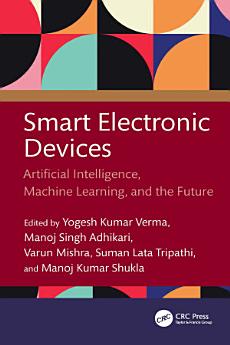Smart Electronic Devices: Artificial Intelligence, Machine Learning, and the Future
About this ebook
Features:
- Explores how cloud and edge computing work together to enhance the capabilities and performance of smart devices, enabling a seamless user experience and facilitating the growth of the Internet of Things ecosystem.
- Discusses the use of smart devices within a smart home system, exploring the seamless connectivity, interoperability, and centralized control.
- Explains the advancements in smart traffic management and smart parking systems, which leverage cutting-edge technologies to address the growing challenges of urban mobility.
- Surveys the growing importance of smart energy management and the integration of renewable energy sources in the pursuit of a sustainable and eco-friendly energy landscape.
- Covers the dynamic relationship between the adoption of smart devices and artificial intelligence technologies, and the diverse regulatory frameworks governing these innovations.
It is primarily written for senior undergraduates, graduate students, and academic researchers in the fields including electrical engineering, electronics, and communications engineering, computer science and engineering, and biomedical engineering.
About the author
Yogesh Kumar Verma is working as an Assistant Professor in School of Electronics & Electrical Engineering, Lovely Professional University, Phagwara, Punjab, India. He received his B.Tech. from Sharda Group of Institutions, Mathura, UP, India in the year 2009. He received his M. Tech. degree in Digital Systems from Madan Mohan Malaviya Engineering College, Gorakhpur, UP, India in 2012. He received his Ph. D. degree from Motilal Nehru National Institute of Technology, Allahabad, Prayagraj, UP, India in 2020. His research interests are simulation and modelling of semiconductor devices. He has seven years teaching experience.
Manoj Adhikari is working as an Assistant Professor in School of Electronics & Electrical Engineering, Lovely Professional University, Phagwara, Punjab, India. He received his M. Tech. degree in digital signal processing engineering from the G. B. Pant Institute of Engineering and Technology (formerly known as G. B. Pant Engineering College), Pauri Garhwal, India, in 2013. He received his Ph. D. degree (Specialization – Solid State Devices) from the G. B. Pant Institute of Engineering and Technology (formerly known as G. B. Pant Engineering College), Pauri Garhwal, India, in 2019. His research interests are simulation and modelling of power semiconductor devices. He has six years teaching experience. He is serving as a reviewer for IEEE Transactions on Electron Devices, AEU – International Journal of Electronics and Communications, Measurement Science and Technology in international science journals.
Varun Mishra has completed his Ph.D. in the area of microelectronics and VLSI from MNNIT, Allahabad. He did his M.Tech in VLSI Design from Uttarakhand Technical University, Dehradun and B.Tech in Electronics and Communication Engineering from Graphic Era University, Dehradun. He is associated with Graphic Era (Deemed to be University) as an Assistant Professor with more than two years of experience in academics. He has published more than 15 research papers in SCI indexed journals and more than 10 research papers in international conference proceedings. His area of expertise includes modeling and simulation of novel semiconductor devices such as Tunnel FETs, Negative Capacitance FETs, HEMTs, etc., low power VLSI circuit design.
Suman Lata Tripathi is working as Professor in Lovely Professional University with more than 23 years of experience in academics and research. She has completed her Ph.D. in the area of microelectronics and VLSI Design from MNNIT, Allahabad. She has completed her remote post-doc from Nottingham Trent University, London, UK in the year 2022-23. She has published more than 164 research papers in international science journals, conference proceeding and e-books. She has also published 20 Indian patents and 4 copyright. She has been listed in world top 2% scientist published by Stanford University for the year 2024.Her area of expertise includes microelectronics device modeling and characterization, low power VLSI circuit design, VLSI design of testing, and advanced FET design for IoT, Embedded System Design, reconfigurable architecture with FPGAs and biomedical applications.
Manoj Kumar Shukla is currently working as an Assistant Professor in School of Electronics and Electrical Engineering at Lovely Professional University, Phagwara, Punjab. He completed his M.Tech and Ph.D. in Electrical Engineering from NIT, Hamirpur (Himachal Pradesh), India. He has 7 years of teaching and research experience. His research interests include control systems, fractional calculus, robotics, automation, artificial intelligence, sensor technology etc. He has published several research papers in reputed international journals and conferences.




